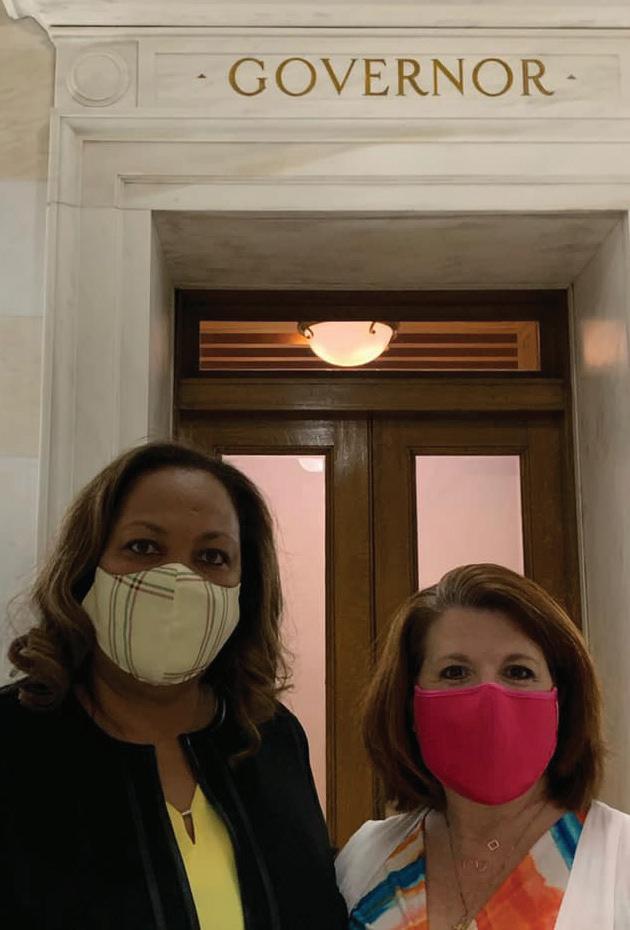
4 minute read
Reopening Recap
Arkansas’s schools reopened in late August against the advice of health experts and despite AEA’s efforts to convince Governor Hutchinson to order a virtual start to the school year.
Despite modeling from the University of Arkansas for Medical Sciences that showed a virtual start would greatly reduce the spread of the virus, as well as an outpouring of concern from parents and educators, the Governor forced a return to in-person learning the week of August 24th.
Advertisement
The decision flew in the face of the recommendation of the Arkansas Chapter of the American Academy of Pediatrics, who announced the state was not ready for a statewide reopening while positivity rates remained well over 10% in much of the state. ARAAP joined AEA for a virtual event that offered educators the most up-to-date guidance on how to stay as safe as possible once the reopenings did take place. Unfortunately that guidance had to be put to use sooner than was safe. While educators expressed happiness to see students again, a patchwork of local policies has resulted in a lack of information. Policies aiming to protect privacy mean educators don’t know if a missing student or colleague is infected, on quarantine, or just out for some unrelated reason. Parents don’t know if schools will remain open week to week, or even day to day, as new positives force shut downs at a moment’s notice.
AEA advocated tirelessly in the months leading up to school reopening, saying that the conditions in our state are simply not safe to reopen schools statewide. AEA President Carol Fleming and Executive Director TraceyAnn Nelson kept lines of communication open with state officials, while at the same time publicly calling on the state to ensure reopening plans did not put our children, educators and their families at risk.
AEA Executive Director Tracey-Ann Nelson and President Carol Fleming

AEA jumped into action in March when the Department of Education put forward a set of blanket waivers as part of the “Ready for Learning” plan. AEA engaged local leaders and lifted their concerns about silencing educator voice and other problematic changes that were ultimately approved by the State Board of Education. Our members then reached out to state lawmakers, asking them to raise the issues during a meeting of the joint education committee.
AEA also requested a suspension of standardized testing and the Teacher Evaluation and Support System (TESS) to instead prioritize the health and safety of students, educators and the broader school community. The ADE refused both requests, saying a suspension of standardized tests would jeopardize federal funding. State officials also claimed a TESS suspension would harm educators’ professional growth. In the same request, AEA also requested that the state shift in professional development requirements to focus on topics that better focus on student needs, including trauma-informed educational strategies, supporting social and emotional health, as well as virtual and other off-site teaching and learning strategies.
An AEA survey drew more than 6,000 responses and confirmed educators fear for their students, families and personal safety due to the coronavirus. More than six thousand teachers and education support professionals responded to the July survey, representing all 75 counties in the state.
The results showed 90% of respondents were concerned about student health issues related to teaching and learning in schools, and 98% believe it would be very or somewhat difficult to implement social distancing or other safety measures in school buildings. In addition, more than 40% of respondents said they were considering retiring early or leaving the profession as a result of the pandemic.
While acknowledging the disruption and learning loss caused by the pandemic, and the importance of in-person instruction, most respondents believe schools should reopen only after public health experts determine it’s safe to return. Educator input and adequate planning and equipment are also necessary to protect school employees, students and visitors from COVID-19.
After sharing those concerns with state leadership, the AEA formed a Return to Learn Committee to develop a list of expectations that must be met before a safe return could be considered to classrooms. The committee is made up of educators from across the state who have used their own expertise, along with guidance from health professionals to create the guidance.
That information was publicly released to the Education Caucus of the Arkansas General Assembly at a meeting called to discuss COVID-19 and schools. Two weeks before schools were set to reopen, AEA President Fleming told state lawmakers it was unsafe for schools to return to inperson learning as Arkansas continued to struggle to limit the spread of the coronavirus.
Fleming also shared the RTL’s set of principles and expectations. The AEA Return to Learn Committee created the school reopening matrix to guide any decisions about the upcoming school year. You can find the full document at
www.aeaonline.org/news
“While we agree in-person education is the best thing for students, moving kids and educators in and out of school based on isolation and quarantine protocols will be too risky and too disruptive to the teaching and learning environment,” Fleming said. “Let’s work together to maximize the next two weeks to ensure that we keep students and educators safe, and prepare for a new way to deliver education and support until we can get this virus under control.”










